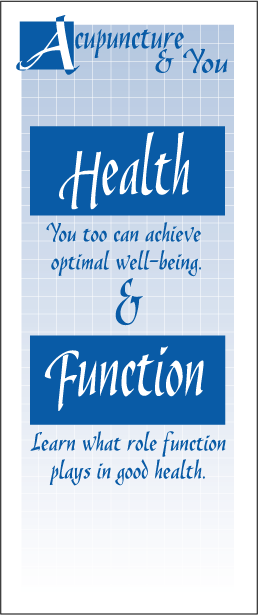
Definitions:
Optimum The condition or degree of producing the best result.
Social Of or pertaining to society or of its organization. Friendly; sociable; also, promoting friendly intercourse. Of or pertaining to public welfare.
Well-Being A condition of health, happiness or prosperity; welfare.
Merely Being nothing more or less than.
Potential Possible but not actual. Having capability for excellence but not yet existing; latent. A possible development; potentiality.
Wholeness Containing all the parts necessary to make up a total; entire. All the parts making up a thing; totality. An organization of parts making a unity.
Indexes Anything that serves to guide, point out, or otherwise facilitate reference as.
Function The natural or proper action for which a person, office, mechanism or organ is fitted or employed.
Our citizens spend ten percent of the nation’s gross national product on hospital and medical care. We have more doctors and hospitals to serve our population than nearly any other country, and yet the United Nations World Health Organization continually rates our population as having one of the lowest general health indexes of any industrialized nation. In other words, the general health of most Americans is poor.
Perhaps the reason that health seems to escape us rather than being our normal experience could be that we do not understand what health is and where it comes from. The World Health Organization has adopted the following definition of health: “a state of optimum physical, mental and social well-being, and not merely the absence of disease and infirmity.”
Most people think health is having no symptoms. This is truly not the case. In fact, the first symptom of heart disease for forty per cent of those who suffer from it is a severe or fatal heart attack!
Symptoms are the end result of the body’s inability to function properly. Currently, society’s emphasis has been on the removal of symptoms rather than on creating an environment in which the body can function as close to 100% as possible.
Health can be achieved and maintained when your emphasis shifts toward creating optimum function, not simply removing symptoms.
1. If you do not have symptoms, you are healthy. True False
2. You should go to the doctor only when you have symptoms. True False
3. When your symptoms are gone, you are well. True False
Function
Definitions
Function The natural or proper action for which a person, mechanism or organ is fitted or employed.
Categories A specifically defined division in a system of classification; a class.
Trauma A wound, especially one produced by sudden physical injury.
Receptive Capable or qualified of receiving.
Resistance Capacity to repel or oppose something, especially disease and sickness.
Prevalent Widely or commonly occurring or existing; generally accepted or practiced.
Interference The act, process or an instance of interfering.
The organs control all body functions. Health is only possible when all the organs of the body are functioning properly. A loss of health can therefore only take place as the result of a loss of function. If the stomach is not functioning properly one can develop bloating, indigestion, ulcers, or even cancer. If the intestines are not functioning properly one can develop constipation, diarrhea and numerous other ailments or diseases. A bone breaks and it has lost its normal function.
One can see from the above examples that without normal function one loses health and only if normal function is restored can we truly say someone has completely regained one’s health.
It is important to recognize the fact that when function is partially lost, symptoms may not develop for days, weeks, months or years later. If the heart lost 25% of its ability to function, it might be years before the first chest pain or high blood pressure occurred. If the heart gradually lost its function over time, the first symptom could be a fatal heart attack.
Illnesses fall into one of three categories. The first is traumatic. Trauma can be physical or chemical in nature. Physical trauma results in breaks, cuts, hemorrhaging and resultant loss of function. Chemical trauma would occur if your body came in contact by ingesting, breathing, or touching a substance that altered normal function. Persons who lose their health via trauma usually find their way to an emergency room.
The second and more prevalent manner in which illness develops is via a body being receptive to infection. For a neighborhood to get an infestation of rats it must first be receptive. To be receptive for rats there must be garbage and an environment that would attract them. To get an infection one’s body must be receptive. One gets sick only if one’s resistance is down. One lose one’s resistance and thus invites such infections as a cold, bronchitis, pneumonia, etc., only if a body does not function normally. If having proper function would prevent an infection, then restoring proper function would be a major factor in getting rid of infection.
The third and increasingly prevalent category of illness is called functional. It is the direct loss of function to an organ or tissue resulting not in infection, but rather simply functional loss. A partial list of functional ailments would include asthma, ulcers, colitis, arthritis, psoriasis, diabetes, etc. These conditions are considered incurable by some physicians, but may respond favorably to treatment designed to restore normal function.
Acupuncturists have as their major therapeutic method the restoration of normal bodily function. They do this by removing interference to the master controller of every body function, the organ system. Chinese medicine works with functional disorders by attempting to increase function to the organ or tissues involved. They do this by removing the principle cause of functional loss, interference to the flow of Qi.
1. When the body has 100% function, it has 100% health. True False
2. A loss of function will ultimately result in a loss of health. True False
3. If you restore normal function, the body will be able to regain its health? True False